Thomas Wharton's Blog, page 11
September 10, 2012
Back to life
Tales from the Golden Goose: Back to Life
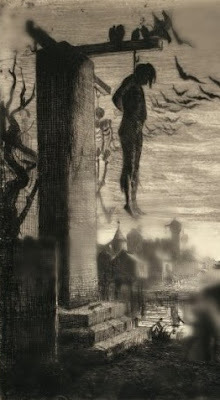
Magic. Enchanted islands. Hm. Well, I’ve seen real magic, and it isn’t pretty. It isn’t nice.
I used to work as a gravedigger. This was in a time of plague, and so work was steady, though the pay was terrible. One time I’d just finished burying a fellow who’d been hung for robbery and murder when this shifty-looking old codger comes sidling up to me. Says he’ll pay me plenty to come back with him to the graveyard at midnight and dig up the body. “I just plant them,” I say to the geezer. “I don’t dig them up.”
He looks around all furtively and then hands me a fat pouch. More in it than I make in a month.
“If we’re caught,” I say, “we could both end up planted ourselves.” (Of course I’m wondering what he wants the body for, but I figure the less I know the better).
“If we get away with it,” he says, “there’ll be more of what’s in that purse for you. A lot more.”
Well, I don’t like the look of this fellow. Ice in his eyes and skin like he’s just been dug up himself. But I agree to meet him at midnight. Had a young wife and a child to feed in those days. Before I lost them to the drink.
So that evening after supper I tell the wife I’m off to the tavern, which was usually the truth anyhow, so my leaving isn’t anything out of the ordinary. And in fact I do stop in for a few pints, to fortify myself for what lies ahead. Near midnight I retrieve my spade from where I stashed it behind the tavern's woodshed and I head for the graveyard.
The old one’s already there, waiting in the shadows. The moon’s nearly full so we don’t need a lantern. That’s one bit of luck. Less chance of being seen out here.
The murderer’s buried in a low patch at the far end of the graveyard, on the other side of a wall from the respectable corpses. He's lucky he's been stashed in the graveyard at all. Connections, I guess.
We find the fresh grave and I get to work.
You’d think a gravedigger would be the last person to get spooked in a graveyard. But I only ever come out to this place in the daytime. Like everyone else I avoid it at night. So even with the drink in me I’m starting to get the creeps. There’s a big wind tonight, which is good because it’s hiding the noise of my spade, but it’s making the trees bend and creak and thrash around like a coven of mad old witches dancing to raise the Evil One. Every little sound makes me jump. The old fellow seems unmoved, like this is nothing new or scary to him. Again I wonder what he wants this body for.
I reach the corpse and clear the earth away from it. He wasn’t buried in a box. Just a sack. I haul the sack up and out, tear it open. The dead man hasn’t started to smell yet. One small blessing. The noose is still around his neck. Face the colour of a turnip that’s been in the cellar too many winters. Tongue swollen and hanging out of his mouth all blue. Strange to think this thing was breathing the air and thinking his thoughts, just like me, only a few hours ago.
“There you go,” I say to the old fellow. “My work is done.”
By now I’m nearly sober and I just want to get the hell out of here at the earliest possible opportunity. I hold out my hand to give him the hint I want the rest of my pay.
“Wait,” he says. “There’s more to do.”
“Not for me there isn’t.”
“He was hung for killing a rich old widow,” the old one says. “Isn’t that right?”
“That’s right. Nearly finished off her servant, too, but he survived and that’s how they caught this fool. The servant knew him. He was some relation of the widow’s. Disgraced nephew, I think. In the old lady’s black books.”
“So they caught him,” the old one says. “But they didn’t find the widow’s gold.”
“He wouldn’t talk. They tried to beat it out of him but he never said a word. Must’ve figured he was going to be hung either way, I guess.”
“I’m going to make him talk,” the old fellow says to me, cool as you please. “He’ll lead us right to the gold.”
That sobers me up completely. I realize now I’m out here in the dark with a raving lunatic. I keep a good grip on my spade and I say, “In case it’s escaped your notice, friend, this lump of wormbait I just dug up isn’t likely to be too articulate.”
The old fellow doesn’t seem to be listening. He’s rummaging in his cloak and brings out a big glass bottle filled with some liquid that in the moonlight looks as black as pitch. He swirls it around, then uncorks it. I stand there, wondering if I should just run, but something’s keeping me rooted to the spot. The old fellow isn’t behaving like a madman. He’s calm. Sure of himself.
“What are you?” I ask, trying to put a sneer in my voice. “Some kind of sorcerer?”
He nods. Just a nod, as if it’s not worth the trouble trying to convince me. And well, that convinces me.
“If you help me now,” he says, “this will be the last grave you’ll ever have to dig. I know you have a pretty young wife, and a child at home. How’d you like to be able to go into business for yourself? I understand the tavernkeeper is retiring, looking for someone to buy his place. That someone could be you.”
He knows a lot about me, that’s clear. Too much. I’d thought it enough times, to be sure, that if only I had a little money, if only this rotten miserly world would give me a bit of luck for once, I’d be on the other side of that bar, filling the glasses instead of emptying them. Maybe the dead man thought something like that too, when he lay awake nights imagining the old lady's gold.
“What do you want me to do?” I hear myself asking.
“Sit him up and hold open his mouth, while I pour this in.”
[to be continued]

Published on September 10, 2012 08:16
September 6, 2012
Miranda's books
Tales from the Golden Goose: Miranda's Books
Well, I’m no storyteller, but your story of the island of singularity reminds me of a tale I once heard about another island…
Prospero was the Duke of Milan, but he wasn’t all that interested in being Duke. He left the running of things to his brother Antonio and shut himself up in his library to study literature and philosophy.
That was a mistake because Antonio, with the help of the King of Naples, overthrew Prospero and set him adrift on the sea in a leaky wreck of a boat, along with his little three-year-old daughter Miranda. They might have perished but for the kindness of an old counselor named Gonzalo, who smuggled food, fresh water and other essentials aboard the boat. Gonzalo, knowing how fond the Duke was of books, managed to conceal a box of them on board as well.
When the boat landed safely on an uninhabited island, practically the first thing Prospero did was tear open the box to get at his beloved books. He was dismayed to discover, however, that the box was not full of his books, but children’s books, for little Miranda. Kind old Gonzalo had been thinking of something to entertain and divert the poor child.

Life on the island was hard, but Prospero read to Miranda every night before she went to sleep, and they both found refuge from their cares in these stories. And when she was old enough Miranda read the books to herself. They were mostly tales of plucky princesses and beautiful miller’s daughters who endured great hardships without complaint and in the end were rewarded with the love of a handsome prince.
By the time Miranda had read the books so often that they’d begun to fall apart, she’d already started making up her own stories. They were mostly stories about the daughters of exiled dukes who had amazing adventures that took them far from their island homes into strange and wonderful places. She told them to herself first, and then to her father. She was happy to see that her stories cheered him, at least for a while, for he was all too often sunk in gloom and self-reproach.
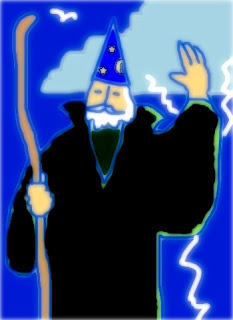
It was then that Miranda conceived of her greatest story. It would be the happy ending to the story of their own lives. In it, the books that came with them on the boat were actually books of magic spells! Yes, in this story her father was a great wizard, and with his magical grimoires at hand he was able to transform the island and make it a true home for them.
He enslaved the dangerous monster … Caliban! He bound the shapechanging spirit Ariel to his will!

That was the story Miranda told to her father, and it cheered him greatly. He laughed at the antics of Ariel, and the buffoonery of the clowns Trinculo and Stephano. He wept at the scene in which he forgave his wicked brother.
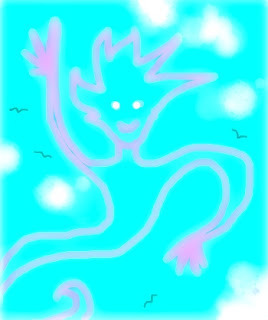
The story sustained him through their long hardships, and he had Miranda tell it again and again, and she did, always reshaping it, refining it, adding subplots, including one that she never shared with her father, about the King of Naples’ handsome son Ferdinand, and how he fell in love with Miranda the moment he laid eyes on her, and she with him, and when Prospero was returned to his rightful place as Duke, Miranda and Ferdinand were married with great ceremony and joy.

At last a day came that Prospero and Miranda were rescued, for no island remains unvisited long in this world. Prospero had many supporters, and with their help he raised an army and took back his dukedom. But he always maintained there was truth in Miranda’s version of events, with its magic and fate and love and poetic justice. For the storybooks had been books of magic in their own way, and her own storytelling had helped him keep his wits intact and his hopes alive during their long exile.
As for Miranda, she continued to invent wonderful stories, and she traveled the world, too, sharing her tales and having all sorts of adventures. People liked her story of the island better than what really happened. It's the one they remembered. And after all, who says it isn't true? After all, I may be the one making things up.

Published on September 06, 2012 07:00
September 4, 2012
Singularity
Tales from the Golden Goose
"Singularity"

I’m a merchant, a man of business. I travel not because I enjoy it but because it’s necessary in my line of work. I travel to faraway lands, purchase exotic wares, bring them home, and sell them to people who can’t or won’t travel themselves. If they did travel they might discover these wares are not so rare and wonderful after all, that one man’s exotic is another man’s commonplace. But if that happened I’d be out of business, wouldn’t I?
What’s the strangest place I’ve been to in my travels, you ask? That's easy. There's an island. Better to call it The Island. It's a place where everything is exotic, but only to the people who live there. No, exotic isn’t the right word. On this island, every single thing is precious. Miraculous. Truly one of a kind.
I warn you right now: never go there.
Let me explain. This island wasn’t on my regular trade route, but I thought I’d have a look and see what sorts of opportunities it might hold for expanding my business. When I arrived I anchored my ship in the island’s one lagoon, rowed to its one beach, and followed the one road up to the one village at the foot of the island’s one mountain. Nothing unusual about that, right? After all, there must be plenty of islands in the world with only one road, village and mountain. True enough, but this island was peculiar in that there was only one of everything else, too. The island had one tree, a pine. One flower, a night-blooming cereus, I believe. One dog. One cat. One mouse. One wild pig. One bird, a very loud parrot who sat in the one tree all day, squawking the same bawdy phrase at everyone who walked by. The village itself consisted of one house, with one window, one chair, one bed. And in the house? One book, one pipe, one spoon, one shoelace….
And yet, as I discovered, there’s one thing the island has many of. People. How do they live? Well, with every single thing that you and I take for granted there’ll always be plenty of, they have to take turns. They take turns sleeping in the one bed. They take turns going for walks on the one footpath with the one dog. They take turns playing the one guitar and singing the one song they all know by heart. Cooking. Chores. Playing ball. Lying on the one blade of grass and dreamily looking up at the island’s one cloud.
So this is why I said that everything on this island is exotic only to the people who live there. After all, if you’ve only got one tree, then a tree is a very special thing, a wondrous thing, an object with no parallel. Nothing to compare it to. A tree is the perfect, ideal tree. A dog is the world’s best dog. A shoelace is the ideal shoelace.
Was I tempted to put an end to this paradise of singularity? Of course. When I first got there I was sure I’d stumbled onto a merchant’s dream. How could I fail to make a fortune in no time selling these poor benighted souls moreof each thing they had only one of? (They had been gaping in awe at the six buttons on my coat, for example.) Imagine how they would marvel, I thought, at the astonishing notion of more than one playing card! At the near-infinite possibility of more than one thumbtack! I hurried back to my ship and loaded everything that wasn’t absolutely necessary onto the rowboat and returned. Look at these! I announced to the villagers, tossing the contents of the boat at their feet. Nails, biscuits, potatoes, bowls, arrows, stockings, pillows. We didn’t have a lot of words in common, but I did the best I could. Many! I shouted. Many is better than one!
It was bound to fail. For one thing, the entire population’s purchasing power consisted of one tarnished copper penny. And even so, they weren’t willing to spend the only coin they’d ever had. To them, it was The Coin. Barter failed, too. They owned nothing they were willing to trade for one more anything.
Things were at an impasse. They all looked at one another with an expression I couldn’t read, and then the village elder stepped forward.
“We thank you for showing us the world of Many,” she said. “We do not need it.”
“But why?” I asked. “I don’t understand. How can one shoe be better than enough shoes for everyone’s feet at the same time?”
She couldn’t explain. Or wouldn’t. They all saw me down to my rowboat, gave me a farewell drink from the island’s one cup, and then a child came forward and presented me with a gift: the island’s one seashell, an unremarkable-looking scallop. I looked at it, and then I really looked at it.
“I can’t accept this,” I said, and handed it back. They looked sad. They must have thought I was offended by such a worthless gift. I wasn’t. Far from it. It was simply that for one moment (and for the people of the island there is only one moment) I had seen the world through their eyes. And since that day I’ve worked hard to drive what I saw out of my mind. I’ve never gone back, and I never will. Because I’m a merchant, right? A man of business. Can you imagine what would happen to trade and commerce if everyone looked at things the way those people do? Well, I can imagine it, unfortunately. Some mornings, when I’m slipping on one of my stockings, or picking up my breakfast spoon, or catching sight of a sparrow building a nest in the branches of the tree outside my dining room window, I can imagine it. And it terrifies me. I see a world that seems to be made of many, but is really only one, and in this world there is no desire for more. There is no better. There is no lack.
Ah, my throat is dry from all this talking. Where’s that barmaid? I could really use another ale.

Published on September 04, 2012 06:44
September 3, 2012
The Golden Goose
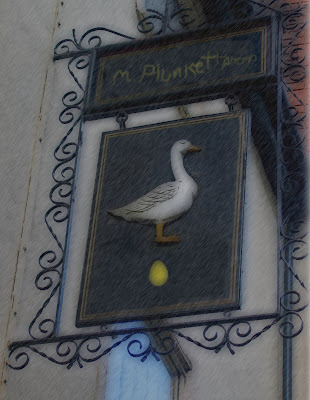
It’s a cold, rainy, miserable night. You’re on your way from someplace to someplace, but you can barely remember where you set out from and where you’re going to, you’ve been on the road so long. You’re soaked to the bones, hungry, tired, alone.
You’ve come to a city you’ve never been to before and you’re looking for a warm fire, supper and a bed. In your pocket is just enough money that you should be able to purchase these three items, as long as you’re not too fussy. Which you’re not. Not this night.
You’re crossing a bridge, searching for an inn, when you see lights from windows above you, and the sounds of laughter and the clink of glasses. You stop, surprised. There’s an inn right on the bridge. You find the stairs that lead up to the entrance. There’s a sign above the door: a goose, a golden egg, and a name: "M. Plunkett, prop."
You stumble in, dripping water from your cloak and hat, and find yourself in a crowded common room. Noise, light, voices, the pleasing scents of ale and wine and good food. You like it here immediately. This is just what you were looking for. You find a seat near the roaring fire. The barmaid brings you a bowl of soup, a hunk of bread, and a foaming tankard. You sit back, content. This is more like it.
The room, you discover, is filled with folk from all over. Some are pilgrims stopping for the night on the way to holy places; others are restless young men and women seeking their fortune; still others are adventurers on quests; and some simply introduce themselves as travelers, like you, on their way someplace from someplace else.
What they have in common is that each of them has a story. And one is being told right now...
[coming soon: Tales from the Golden Goose]

Published on September 03, 2012 08:31
August 30, 2012
Are vampires real?

When my daughter was little she used to wonder about the imaginary creatures and monsters she’s heard about or read about in storybooks. Were they real? She already had a pretty good idea they weren’t, but she still needed to ask, just in case.
I had two answers for her, depending on whether the creature was one she liked, or one she was afraid of.
Answer # 1:
“Dad, are unicorns real?”
“Yes, they’re very real … in your imagination. And imagination is one of the most powerful forces there is. Without imagination we would never have been able to invent new things, fly to the moon, or discover cures for disease. Sometimes we need imaginary things that we don’t find in the real world. We need to believe in them because they mean something important to us…”
Usually by the time I got this far she’d already walked away.
Answer # 2:
“Dad, are vampires real?”
“No.”
Apparently the question “are vampires real?” is a very common internet search query. Vampires have so permeated pop culture that it’s not surprising people have begun to wonder whether they’re really just fiction or not. Further confusing the issue are the people out there who believe they themselves are vampires. They live a vampire lifestyle (or undeadstyle), in some cases to the point of convincing people to donate blood to them so they can drink it.
As far as I know there isn’t a subculture of people who think they’re unicorns. I wonder why not. Harder to fake a great big ivory horn, I suppose.
But then again, in my opinion vampires and unicorns and iron golems and talking trees do exist. They exist in a dimension we call Story. In my fantasy novels I call this dimension the Perilous Realm (a phrase coined by J R R Tolkien, I believe). Some people also call it the Storyverse. This story dimension permeates our own. We move in and out of it on a daily basis. We’re always telling ourselves stories … about who we are, about things that happened in the past (we call these stories memories), about what we hope will happen in the future. We spend much of our time living inside these imagined story-worlds of hopes, memories, dreams, fears. Are these stories “real”? They have a powerful impact on how we live our lives, that’s for sure.
More on the “story dimension” coming in another post.
Illustration: T Wharton

Published on August 30, 2012 07:49
August 27, 2012
The Blank Tarot

Pick a card, any card. It doesn’t matter which. They’re all blank.
Tarot cards seem to be more popular than ever these days. Most people use them for spiritual guidance or predicting the future, although some, like the wizard Calvino, use tarot cards to invent stories. Personally I prefer the latter use. I don’t believe tarot cards are magical or that they can tell you anything about yourself you don’t already know. But they can help you think creatively.
That’s why I want to tell you about a tarot deck that originated, it’s said, in the Perilous Realm. It’s called the blank tarot. The deck consists of 78 cards with nothing on them. Every card is the same: blank and featureless.
Here’s what you do: shuffle the cards well. Take a moment to think about the problem or the answer you seek that led you to consult the cards. Then draw one card and look at it. You can imagine there’s an image on it, any image you like, or you can just keep the blank card in front of you as you meditate for a few moments on what you’re seeking. You can also lay out a sequence of several cards and make up a story by imagining an image or scene on each card. Don’t try to solve the problem or force an answer. Just let your thoughts come and go.
Sounds silly? Maybe it is. I mean, why bother with the cards at all, right? You could just stare at a blank wall or close your eyes and imagine whatever you like. People who use the blank tarot, however, say that there’s something about going through the actions of shuffling and then drawing the cards that helps them get in the right frame of mind. Because the cards are meant for consulting and problem-solving, (unlike a blank wall), they help foster an imaginative, creative attitude in the one using them.
The point is that you decide what the cards mean. If each card could be any card, you face your own freedom as a human being. You use your own creativity and imagination to help you to the solution or answer you seek. Because that’s where the answer is anyway. In you, not in some arcane image invented hundreds of years ago.
If you’d like to try the blank tarot, you can find blank card decks at teacher supply stores or on the internet.

Published on August 27, 2012 07:29
August 24, 2012
Popular Posts from the Past: Ice Dragons
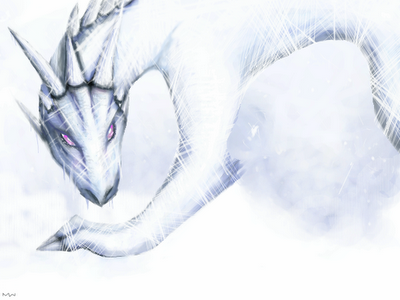
Long ago, when much of the Perilous Realm was locked in a neverending winter, the ice dragons ruled. They were mighty creatures, powerful and unpredictable. Few humans ever saw them, for they dwelt only in the most frozen, inaccessible regions. Nor were they interested in gold or treasure or in capturing princesses, like their more avaricious and meddlesome cousins, the dragons of fire.
Those few storyfolk who dared travel in the lands of ice brought back tales of huge winged shapes that left blizzards of frost in their wake, of avalanches that had the power to change direction and even charge uphill, of lakes that would suddenly freeze over, or just as suddenly crack apart and plunge travelers into the icy water.
There are those who say that the glaciers we see today are the sleeping bodies of these mighty beings, and that although their kingdom has shrunk much from what it once was, they may still be roused from their slumber. Even as it withers away and dies, ice is a magnificent and dangerous phenomenon to behold.
In The Shadow of Malabron, Rowen of Blue Hill has a very close encounter with an ice dragon on the Whitewing Glacier. An encounter that will have important consequences for the fate of Fable and all of the Perilous Realm.
Illustration by Mary Wharton

Published on August 24, 2012 07:26
August 22, 2012
Golem
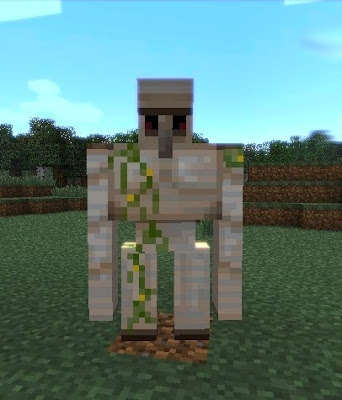
My son was playing Minecraft and I was watching (I can’t play computer games: a few minutes of that jerky screen motion and I start to feel like I’m going to throw up). Some sort of creature I’d never seen before appeared on the screen. I asked my son what it was and he told me it was an iron golem. It was protecting the village.
An iron golem?
I did some looking around. Golems are cropping up in stories, games and elsewhere more and more often nowadays. And they’re not just made of clay anymore. There are golems of iron, stone, diamond, fire, blood, and snow in games like Minecraft and Diablo. Sometimes they're protectors, sometimes destroyers.
There are days as a writer when I feel like a golem myself, performing endless toil from which there is no escape unless someone releases me with a magic word. Like “Lunch!”
Much like Ord, the man of clay in The Perilous Realm trilogy, the origins of the golem legend are wrapped in mystery. There are ancient Jewish tales of beings created from earth and given life, and in the Talmud even Adam himself was said to have been a golem until God granted him mind and will. One of my favourite modern interpretations of the Golem legend is the moving retelling by David Wisniewski, with dramatic illustrations made of cut and torn paper.
Come to think of it, why not a golem made of paper? I may just have to write that story myself.

Ord The man made of clay plunges his thick, powerful arms into the muck of the bog.
Without any sign of strain or even a grunt of effort, he uproots an immense stone and lifts it over his head.
The man of clay carries the stone to a tower standing by itself in the middle of this bleak, uninhabited bog. The tower is unfinished. It is roofless and has a gaping hole for a doorway.
The man of clay climbs the winding stair inside the tower. At the top he sets the stone he is carrying in place on top of the unfinished wall.
He pauses for a moment as if to survey his work, although his face remains expressionless. In the middle of his forehead is a small mark. A shape that could be a letter in some unknown alphabet.
The man of clay descends the tower and strides off into the bog to search for another stone.
No one knows who brought this creature to life and commanded it to toil like this day after day. Those who wished the tower built may be long dead.
Slowly, steadily, without rest, the clay man builds the tower, day after day. And day after day the tower sinks a little further into the bog. The man of clay will never finish the tower. He will keep adding stones but the tower sinks faster than he can build it up.

Published on August 22, 2012 13:25
August 20, 2012
The Elements of Story ... the Fifth Element
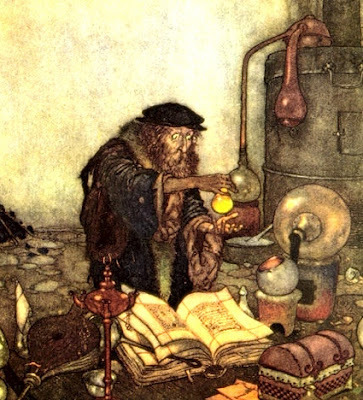
The Elements of Story # 5: The Fifth Element
In earlier posts I’ve played around with the four classical elements of water, earth, air, and fire by imagining them as the elements of Story. But there was another element in ancient philosophy, sometime called the quintessence, or the fifth element. In Greek mythology it was the pure, celestial aether that the gods breathed, then was later defined by classical and medieval philosophers as a substance without any physical properties, or a quality of the universe that was “subtler than light.” Then there’s the 1997 Bruce Willis science-fiction film which reveals that this subtle, mysterious element, with the power to save the world, is LOVE.
So what’s the fifth element of story? I had a tougher time with this one than the other four. What was the subtle, magical “aether” in which a story takes place? It had to be something common to every story, whether told by book or screen or even the good old-fashioned human voice. Could I really pin down something so elusive and mysterious? In the end I realized I couldn’t define the fifth element, or I didn’t want to. Instead it made more sense to get at it by way of a story. It’s a very short story but one of my favourites -- I posted it on this blog a couple of years ago. It’s Tale 200 in The Complete Grimm's Tales for Young and Old, translated by Ralph Manheim:
The Golden Key
One winter's day, when the ground lay deep in snow, a poor boy was sent to the forest with a sled to bring back wood. After gathering the wood and loading it onto to the sled, he was so cold that instead of going straight home, he thought he'd make a fire and warm himself a bit. He cleared a space, and as he was scraping away the snow, he found a little golden key.
"Where there's a key," he said to himself, "there's sure to be a lock."
So he dug down into the ground and found an iron box.
"There must be precious things in it," he thought. "If only the key fits!"
At first he couldn't find a keyhole, but then at last he found one, though it was so small he could hardly see it. He tried the key and it fitted perfectly. He began to turn it--and now we'll have to wait until he turns it all the way and opens the lid. Then we'll know what marvels there were in the box.
The Grimm brothers placed this story last in their collection, as if to remind us that stories and storytelling have no end but go on and on through the ages. It’s also a story that draws you in with a character you can begin to care about, and a mystery, and then, just as the story seems to be about to really get going, it leaves you hanging. One can imagine a traditional storyteller ending an evening’s performance with this tale-with-no-end, as a way of bringing her audience back to the real world while reminding them of her skill. As if to say “See how I have you under my spell? Now I’m letting you go.”
Together a story, its teller, and its listener enter a magical space, a field of invisible forces that draws much of its energy from the desire to know what happens next? This is the fifth element, the quintessence of Story.

Published on August 20, 2012 07:06
August 15, 2012
Fathomless Fire book trailer
The new Fathomless Fire book trailer
is now on Youtube!
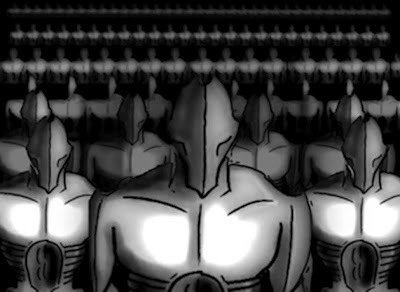
Trailer produced by Chris Hill. Music by Conor Wharton. Illustrations by T Wharton.


is now on Youtube!

Trailer produced by Chris Hill. Music by Conor Wharton. Illustrations by T Wharton.

Published on August 15, 2012 09:00



